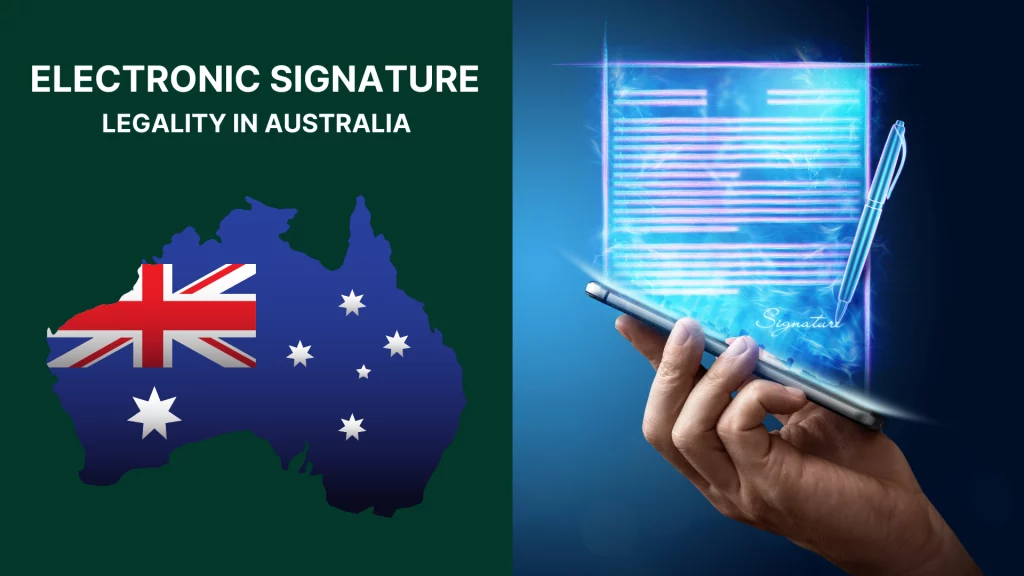
Electronic Signatures Corporations Act in Australia
The Corporation Act in Australia has been amended as of 2001. Because of this amendment, virtual meetings and electronic signatures are now considered official. Electronic signatures can now be used to execute official company documents.
The amended Corporation Act comes with provisions for electronic signatures for the execution of company documents under section 127.
Are digital signatures legally acceptable?
The Exposure Draft allows the use of witnesses to the signing through teleconferencing and other forms of technology. Such an arrangement can be permitted if:
- The director, the secretary, or a witness can view the documents in their entirety and are able to identify the signatories. They should also be able to confirm the intent of the signatories through the teleconferencing medium.
- The method or medium used should be appropriate and reliable for the purposes of generating the document.
- Reputable electronic signing services can be considered an appropriate and reliable method or medium.
- The remote witness should be able to view the actual affixation of electronic signatures and should also be able to affix their own.
Though these amendments have been recently added, they are still consistent with the Electronic Transactions Act 1999. This older act lists a similar set of requirements.
The amendments proposed are technologically neutral. Legislation should at least be able to check how the platform works to interpret the witnessed signing.
New and emerging technologies should then continue to make their improvements transparent for better interpretation.
The Exposure Draft emphasizes that participation can vary for various companies, whether they be corporations or family-owned businesses. The law is also willing to be flexible to accommodate the changes in technology and businesses’ global expansion.
Legislation and requirements within Australia
Not only are digital signatures legal in Australia, but electronic signatures as a whole are also commonplace for business transactions. Australian laws accept all types of electronic signatures just as they would be handwritten or “wet” ones.
What are the legal requirements for a digital signature?
These signatures have to meet some requirements
- The transaction should allow the identification of the signatories and the indication of true intention to sign the documents
- The method should be reliable and appropriate to the type of transaction.
- The signature should clearly express the intention to sign.
- The signatories must be aware of what the contents are for them to have this intention.
Notice that the requirements are similar to the general legislation on electronic signatures. However, the federal nature of Australia’s government creates some complications.
For example, the national level follows the Electronic Transactions (ET.) Act of 1999.
Therefore, signatories must inspect the ET Act of 1999 when dealing with Commonwealth Laws-governed transactions. Each Australian state and territory follows its own legislation of electronic transactions.
These individual legislations generally follow the ET Act of 1999 but add their own specifications, as needed by their states.

What is the validity of digital signature?
As a whole, Australian courts have allowed the use of a finger or a stylus to sign documents through a computer. The country’s laws also do not limit the storage of electronic signature data within itself.
However, the same cannot be said if the signature data carry personal information. In that case, Australia’s Privacy Act will be enacted when deciding to send the data overseas.
When using electronic signatures in Australia, the signatories must consider special provisions. Some cases may require traditional signatures, for example.
When dealing with the public sector, providing an e-signature must meet the particular department’s requirements. Therefore, unique specifications may not only exist in some states but also in some departments in the same state.
The Corporations Act 2001, meanwhile, is independent of the Commonwealth ET Act. Therefore, it specifies some provisions in which only a traditional wet signature can be accepted. A document can then only be considered to have been duly executed if:
- Two directors of the company have signed
- A director and the company secretary signed
- The sole director and sole company secretary signed
To summarize, Australia considers electronic signatures legal. The use of e-signatures is widespread in the country, and the general legislation that makes it possible is mainly the same throughout Australia.
However, there is a need to be familiar with each state’s law. The federal government format of the country has allowed for individual states to add their specific additional requirements.
Companies should then not only consult the Commonwealth ET Act but also consult the laws of the state that they are in.
There may even be variations in requirements among public sector departments within the same state. Furthermore, corporations may still opt to choose the affixation of traditional wet signatures.
As for the data found in electronic signatures, they can be transmitted and stored outside of Australia, provided that they do not contain personal information.
Featured Platforms: PandaDoc, Formstack Sign, DocuSign, HelloSign
